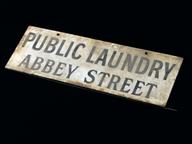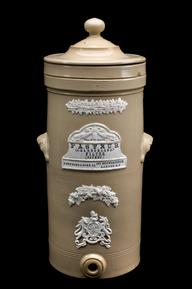

Face covering worn by health workers
- Made:
- 2014-2015 in unknown place
Full cover plastic face mask, worn by health workers, mainly as protection against sprayed disinfecting bleach during the Ebola outbreak in Sierra Leone, 2014-2015
Healthcare workers at a temporary Ebola diagnostic and care facility at a site in Makeni in Northern Sierra Leone, wore this type of face covering as part of their Personal Protective Equipment (PPE). At the time, PPE, handwashing, disinfection, waste management and separating out people with Ebola were the only ways of protecting the surrounding communities and frontline workers. The World Health Organisation recommended a number of disinfectants to quickly remove and kill the Ebola virus including domestic bleach. The virus is spread through contact with the body, blood, body fluids of someone with Ebola or the equipment used to treat them.
Set up by the International Medical Corps the clinic in Makeni included frontline interactions with suspected or confirmed cases, the daily diagnostic procedures as samples were tested through to the administrative elements of certification and the role of health awareness materials.
The West African epidemic of Ebola that began in 2014 was the most widespread outbreak of the virus disease in history—causing major loss of life and disruption to society and the economy, mainly in the countries of Guinea, Liberia, and Sierra Leone. It became international news and prompted an international medical response. In June 2016 when Guinea was the last country to be declared free of Ebola, there were more than 28,000 cases and more than 11,000 deaths. Since 2021, a vaccine has been available to protect high-risk populations and frontline workers.
Details
- Category:
- Public Health & Hygiene
- Object Number:
- 2018-534
- Materials:
- plastic
- type:
- face mask




